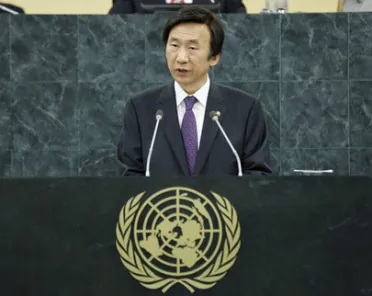Statement
Statement summary
YUN BYUNG-SE, Minister for Foreign Affairs of the Republic of Korea, underlined his country’s global engagement globally in peacekeeping and reconstruction as well as in its membership of the Security Council and the Human Rights Council. However, the rise of new global challenges such as climate change, terrorism and cybercrime called for global cooperation that transcended the existing inter-State system. The Republic of Korea’s new Administration had put forward its foreign policy vision for building on two fundamental objectives — happiness of the people and happiness of the global community. The proliferation of weapons of mass destruction posed serious threats to international peace and security, he said, strongly condemning the use of chemical weapons in Syria. He welcomed the agreement between the United States and the Russian Federation on elimination of those weapons and called on the Syrian Government faithfully to implement its commitments in that respect. He also called for concerted international efforts to roll back the nuclear weapons programme of the Democratic People’s Republic of Korea. Alongside the proliferation of weapons of mass destruction, terrorism also presented a grave threat to international peace and security, he said, strongly condemning the terrorist attack in Kenya. Noting that the number of refugees and internally displaced persons worldwide had risen, worsened by the conflict in Syria, he emphasized the need to protect civilians in conflict situations, especially from sexual violence, and called for responsible measures to restore the victims’ honour and soothe their pain. The next set of common development goals should therefore be people-centred, taking standards of well-being beyond traditional income levels and seeking to build partnerships with newly emerging development actors as well as striving for a united response to climate change. “The deepening of global interdependence has led to the rise of challenges requiring a common response, and therefore, expectations of the United Nations are now higher than ever before,” he said.
Full statement
Read the full statement, in PDF format.
Photo

Previous sessions
Access the statements from previous sessions.
